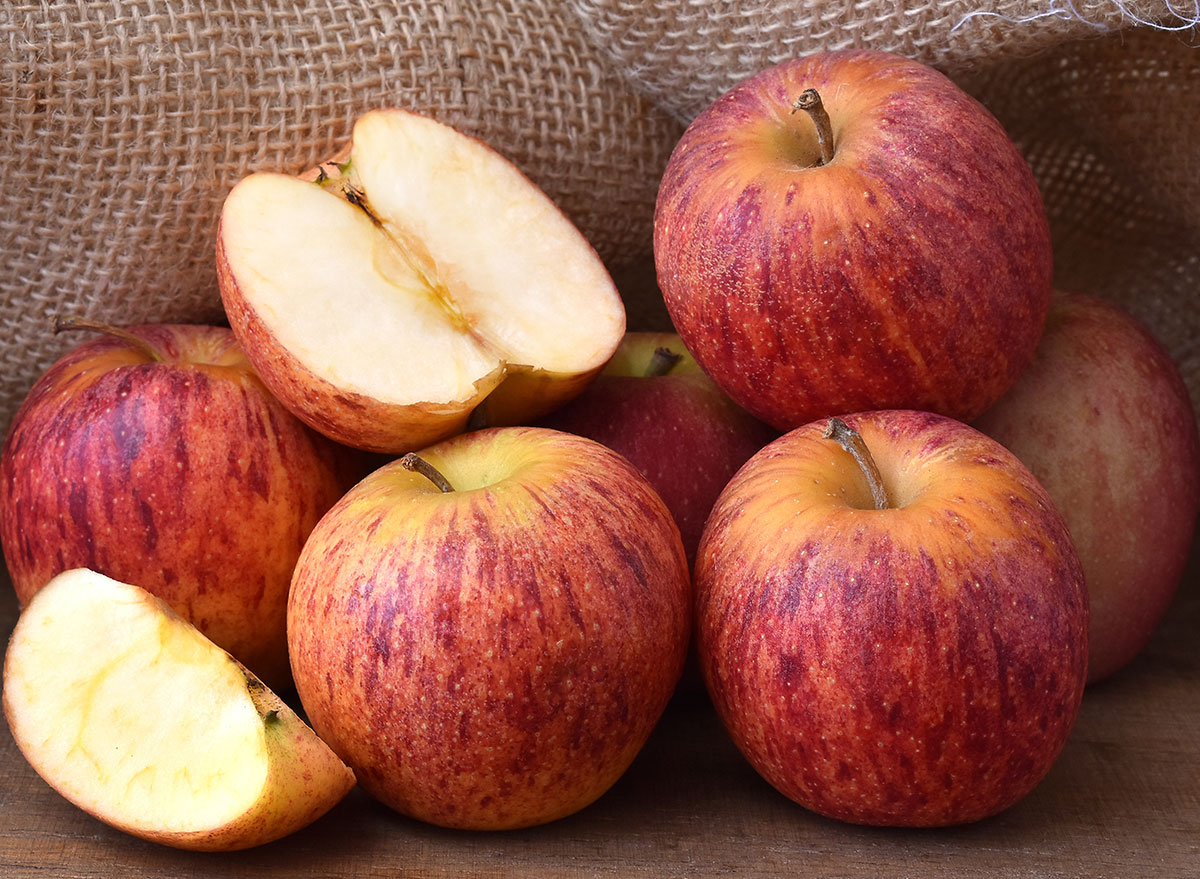What Happens To Your Body When You Eat an Apple Every Day

Fun fact: the first recorded use of the phrase "an apple a day keeps the doctor away" dates back to the 1860s, when it actually originated as "eat an apple on going to bed, and you'll keep the doctor from earning his bread." (We think the modern version is a bit snappier.) Eating a variety of foods is a hallmark of healthy eating, but apples really are worth eating every day. From Granny Smiths to Pink Ladies, you certainly have your choice of varieties, all of which boast tons of health-promoting nutrients.
Here's what happens when you eat an apple every day, and for even more healthy tips, check out our list of The 7 Healthiest Foods to Eat Right Now.
You'll have a healthier gut.

Apples are full of one nutrient most people don't get enough of—fiber. With 5 grams per medium fruit, a single apple knocks out 20% of your daily target of 25 grams. Not only does fiber smooth your digestion and prevent constipation, it promotes a healthier microbiome (aka the good bacteria in your gut). Much of apples' fiber comes from pectin, which produces an acid called butyrate. This acid is especially known for feeding beneficial gut flora. Learn other ways to eat right for gut health with our handy guide.
You might lose weight.

Could an apple a day keep excess pounds at bay, too? Possibly. According to a 2018 review of multiple studies on both humans and animals, eating apples was associated with a lower weight. In the five human studies analyzed, four to 12 weeks of consuming 240 to 720 milligrams of apple or apple juice per day were effective for weight loss. How many apples is that, exactly? Not that many! One large apple is about 240 grams.
If you need further inspiration, get your apple on with these 25 delicious recipes!
You'll curb inflammation.

Systemic inflammation is a driving factor behind a host of chronic diseases—so we'd all do well to reduce it as much as possible. Eating an apple every day may help! This fruit is rich in an antioxidant called quercetin, which research shows tames inflammation in the body. Meanwhile, additional antioxidants like catechin and vitamin C join the mix to reduce oxidative damage in your cells. Check out our list of other foods that fight inflammation.
You may lower your risk of diabetes.

Since diabetes is a blood sugar disorder, you may not think fruits have a place in diabetes prevention. But with their high fiber and antioxidant content, eating an apple every day can actually have a positive effect on blood sugar management. A 2013 study found that greater consumption of apples, among a handful of other fruits, was associated with a reduced risk of developing Type 2 diabetes.
You'll boost your immunity.

Oranges typically get the glory for being a high-vitamin C fruit, but apples deserve credit for this micronutrient, too. One medium raw apple contains 14% of your daily vitamin C needs. Getting enough vitamin C keeps your immune system functioning properly, as its antioxidant properties protect against pathogens and reduce oxidative stress. Deficiencies of this critical vitamin have been linked to higher susceptibility to infections.
Of common grocery store varieties, Granny Smiths contain the highest amount of vitamin C at 12 milligrams per 100 grams of fruit. Or, if you're really looking to boost your C, seek out rarer varieties like Sturmer Pippin, Calville Blanc, or Baldwin apples, which contain up to 40 milligrams per 100 grams.
You'll reduce your risk of death from any cause.

Who wouldn't want to dial back the risk of death by any cause? A 2016 study that followed older women for 15 years found that those who ate more apples were less likely to die from any health condition. Specifically, the women in the study had lower risk of death from heart disease and cancer. Sounds like reason enough to grab a Gala and get munching!








